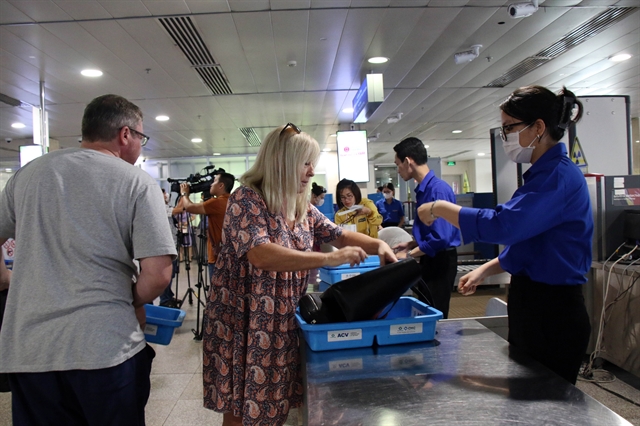 Society
Society


|
| Foreign tourists arrive at Tân Sơn Nhất Airport in HCM City. — VNA/VNS Photo Tiến Lực |
HÀ NỘI — Over 337,000 foreign nationals arrived in Việt Nam between August 15 and August 30, thanks to a unilateral visa exemption, which represented 70 per cent of all entries during this period, as reported by the Department of Immigration of the Ministry of Public Security on Wednesday.
The majority of these foreign visitors hailed from South Korea (155,000), Japan (30,000), and the United Kingdom (8,000).
On Wednesday, the immigration department conducted a press conference to discuss the enactment of the revised Law on Entry, Exit, Transit, and Residence of Foreigners in Việt Nam, as well as the Law on Entry, Exit, and Residence of Vietnamese Citizens.
This legislation was ratified by the National Assembly in June 2023 and came into effect on August 15.
Major General Phạm Đăng Khoa, director of the department, noted that the new visa policy of Việt Nam has been well-received and positively evaluated by foreign tourists, particularly the Chinese. This presents an opportunity for the tourism sector of Việt Nam to enhance its competitiveness compared to neighbouring countries.
He further mentioned that the facility for citizens from all countries and territories to apply for an e-visa would stimulate tourism in Việt Nam, marking a pivotal moment in the advancement of tourism and the attraction of foreign investment.
At the same time, Vietnamese citizens are also granted favourable conditions to enter other countries following the principle of reciprocity, he said.
Since the law took effect on August 15, there have been 112,058 applications for electronic visas, an increase of over 70 per cent compared to the period before August 15.
Of these, Chinese citizens applying for electronic passports account for about 10 per cent (9,130 applications). The number of citizens from countries newly eligible for e-visa policy has reached 50 per cent with 56,000 applications.
Increasing the temporary stay period from 15 days to 45 days has encouraged international tourists to select travel and resort programmes across Việt Nam and between Việt Nam and other countries with flexible schedules, improving Việt Nam’s tourism competitiveness in the region, he said.
The amended law has increased the duration of an electronic visa (e-visa) from 30 to 90 days. The Government shall decide on the list of countries and territories with granted citizens, as well as which international border gates will allow foreigners to enter and exit by e-visa.
Foreigners are required to present their passports and valid documents in Việt Nam to accommodation establishments to declare temporary residence.
Agencies, organisations and individuals that detect signs of violations on entry, exit, transit and residence of foreigners in Việt Nam must immediately notify local public security forces.
In case of detecting signs of violation in the border area, they must immediately notify the police or the nearest border station.
Automated immigration system
Responding to questions over the operation of automated immigration control gates, Colonel Nguyễn Bá Tuấn, deputy head of the immigration department, said the system has applied technology that other countries are currently using to clearly identify passports and passport users accurately.
The automated immigration control gates are not applicable for people under 14 years old due to specific requirements on height and ages, he said.
As of August 30, 750,000 people are eligible to use the automated gates. About 30,000 Vietnamese citizens and foreigners have entered and left the country through the system.
Tuấn said the automatic immigration control system deployed at airports uses facial recognition, passport scanning and reads information from electronic chips to automatically determine identity and passenger information when they enter or leave the country.
Autogate allows passengers to conduct their own immigration and departure control processes quickly and conveniently. Instead of having to wait at traditional checkpoints, passengers can use the gate to check in automatically without security staff, he said.
The system will automatically verify passenger information, compare it with data in the database and allow them to continue their journey quickly.
The technology helps reduce queuing time, improve efficiency and increase passenger experience at the airports. It also helps improve border management and security, reducing the risk of tampering and fraud during immigration controls, he said. — VNS




